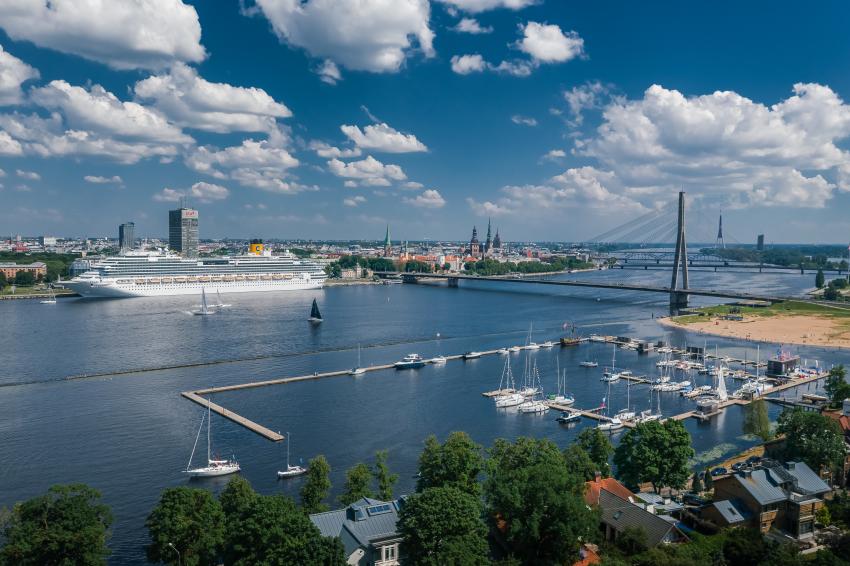Riga Ropax Terminal in cooperation with the Freeport of Riga Authority as the Lead Partner of the project, the Port of Stockholm, the Port of Klaipeda, the City of Stockholm and Hochschule Wismar, University of Applied Sciences, Technology, Business and Design submitted an application to the Interreg Baltic Sea Region transnational cooperation program. The objective is to receive funding for a study on reducing the ecological footprint at passenger and ro-ro terminals in the city centre in three ports – Riga, Klaipeda and Stockholm – by studying air, sound and wastewater pollution.
Provided the submitted project is approved and desired funding is received, not only appropriate research would be carried out in the relevant ports, but also simulations aimed at assessing the effectiveness and efficiency of the most appropriate instruments for reducing the ecological footprint would be conducted. In the framework of the project, it is planned to place wastewater pollution monitoring sensors in the water area of the southern part of Eksportosta at the new passenger and ro-ro cargo terminal – Riga Ropax Terminal, as well as install equipment for monitoring continuous air quality measurements.
Passenger and ro-ro cargo terminals located near the populated areas have a major impact not only on passenger transportation, including access to and from the terminal by private cars, taxis and public transport, but also on the sea freight. Passenger and ro-ro cargo terminals are becoming more modern, innovative and their environmental impact is regulated, nevertheless the operation of the terminal affects the population and the environment in its vicinity. That is why it is important to find innovative solutions for monitoring and mitigating the impact of terminal operations.
Jūlija Bērziņa, Project Manager at Riga Ropax Terminal: “The aim of the project is not only to identify the potential water pollution risks, but also to implement practical measures, including, for example, the deployment of wastewater pollution monitoring sensors. The sensors deployed within the framework of the project would monitor the wastewater quality and notify in case of unexpected or increasing pollution. There is also a risk of sewage contamination at passenger and ro-ro cargo terminals due to potential leakage of oil or fuel. Monitoring of ship-generated wastewater pollution is particularly important, and it will ensure continuous monitoring of water quality at the port. In addition, it is planned to provide air quality monitoring and propose measures to improve air quality.”
The project would address the problems of air, sound and wastewater pollution related to the operation of passenger and ro-ro cargo terminals in the city center. The research outcomes would help passenger and ro-ro cargo terminals to find better ways to improve the life quality of the waterfront areas’ residents and build a more environmentally friendly city. High quality wastewater control level, the ability to react and collect polluted water almost immediately, as well as the rapid response capacity to protect the environment from larger-scale pollution are just some of the most important benefits of such a project. In the Port of Klaipeda, solutions for rainwater harvesting will be tested, while solutions for noise abatement will be tested in the Port of Stockholm.
Ansis Zeltiņš, the Freeport of Riga CEO: “Acquisition of real-time data on the impact of port activities on the environment and the quality of local residents’ life is an important prerequisite for planning the port's development, improving operational processes and reducing the potentially negative impact. We are happy to cooperate with other ports, scientific organizations and port terminals of the region on implementing this research project with the aim to share experience, knowledge, as well as pilot various innovative solutions together".
Riga Ropax Terminal
Riga Ropax Terminal is a modern, environmentally friendly terminal that, upon successful implementation of the project, will effectively serve Riga passengers in one of the city's three transport hubs and at the same time provide high-quality, modern, public commercial use and entertainment opportunities already in 2027.
The new Riga Ropax Terminal project includes: a public waterfront; new commercial premises; creative spaces; extensive retail options; a modern infrastructure for servicing passengers and ro-ro cargoes; a landscaped public space; an additional infrastructure for cruise ships with a perspective - to create a home port of the cruise line with restaurants and cafes, accessible for residents of the neighborhood, providing sound and air pollution reduction in the city center and ensuring safe movement. https://ropax.lv/lv
 English
English























